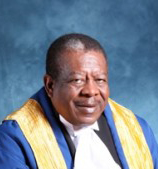Caribbean Court of Justice (CCJ) President Sir Dennis Byron on Wednesday reiterated the importance of having substantive judicial appointments and called for the impasse between President David Granger and Opposition Leader Bharrat Jagdeo to be resolved soonest.
“It is much too long for a country to be without a Chancellor and a Chief Justice and I think it’s important for that situation to be suspended as soon as possible,” Sir Dennis told Stabroek News shortly after delivering a lunchtime keynote address at the 3rd International Conference on Commercial Arbitration.
More than two months have passed since Jagdeo said no to the nominees for the posts of Chancellor of the Judiciary and Chief Justice, which were submitted to him by Granger.
Article 127 (1) of the Constitution clearly states that both sides must agree on the nominees before the substantive appointment can be made. “The Chancellor and the Chief Justice shall each be appointed by the President, acting after obtaining the agreement of the Leader of the Opposition,” it states.
Granger in January informed Jagdeo that his choice for the top post was Belizean Chief Justice Kenneth Benjamin, while acting Chancellor Yonette Cummings-Edwards was his nominee for Chief Justice. The two met on the issue and Jagdeo asked for some time to deliberate on the matter. On February 7th, 2018, by way of letter, Jagdeo informed government of his disagreement with the nominees.
Since then, there has been no word from government or Granger on what is the likely solution to this situation.
Asked what should be done in this situation, Sir Dennis said that from the time he assumed the leadership of the Caribbean’s final court, he has stressed that it is important that the constitutional expectations—that there is an appointed Chancellor of the Judiciary and Chief Justice—are realised.
With regards to whether Guyana ought to be reforming the law to deal with situations like the one happening now, Sir Dennis noted that he expressed his opinion on this during the 37th Annual Bar Association Dinner held last November.
“If it is thought that there needs to be a change in the legislative framework, then those responsible should change the laws but it might not be necessary in order to achieve the required objectives. It might be that within the framework of existing legislation there are solutions that could be found and that is the view I expressed.” he said.
While delivering the keynote address at the dinner, the CCJ head had said it was disappointing that no substantive Chancellor has been appointed after Justice Desiree Bernard’s departure and noted that having both offices being led by judges acting in respective capacities is “a most unfortunate state of affairs.”
He had bemoaned the inability of successive presidents and opposition leaders to agree on appointing a substantive Chancellor of the Judiciary, while warning that prolonged acting appointments pose a genuine “risk” to the promise to citizens of an independent and impartial judiciary.
“With the passage of 12 years, the undesirability of further delay could no longer be controversial. This is a very serious issue because attacking the problems of delay and all other issues that need reform requires strong leadership,” Sir Dennis had said. “It is simply obvious that a leader who is not appointed is under a disadvantage, and criticisms of the sector need to be received with the knowledge of the impediment that is placed on the leadership of the institution, an impediment which the Constitution specifically frowns on,” he had added.
The CCJ head used the occasion to issue a call to “the high officials of our community” to execute their constitutional duty and appoint the highest judicial officials, as an important element in guaranteeing judicial independence to citizens.
He had added that “The delay in complying with section 127(1) of the Constitution has long reached a level of justiciability and the most appropriate authority for resolving this situation is the court system.”
Senior Counsel Ralph Ramkarran and the Guyana Bar Association subsequently both concurred with Sir Dennis Byron’s position that recourse can be sought in the courts.
At the moment, Justice Cummings-Edwards is the acting Chancellor while Justice Roxane George SC is the acting Chief Justice. They were both appointed last year, weeks after the retirement of then acting Chancellor Carl Singh. Singh was the acting head of the Judiciary for about 12 years. Justice Ian Chang was also still acting in the Chief Justice position when he reached retirement age months earlier.
Granger, while opposition leader, had refused to agree to Singh’s substantive appointment, saying that that position as well as the Chief Justice post must first be advertised in the interest of transparency before there is any confirmation. The then PPP/C government had argued that such a process was not catered for by the law.






